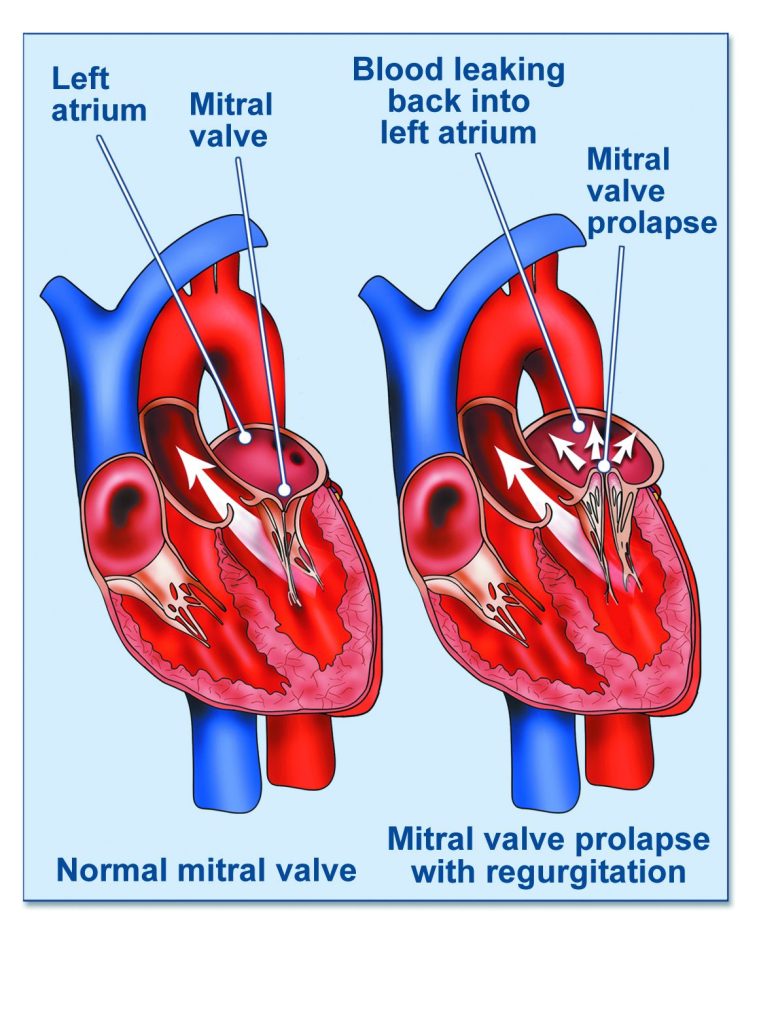
What is the mitral valve?
The mitral valve is a valve with two leaflets situated on the left side of the heart. It is a one-way valve that allows blood to move from the top chamber of the heart (left atrium) to the bottom chamber (the main pump – the left ventricle).
What is mitral valve prolapse?
Mitral valve prolapse is a condition where the one or two of the leaflets of the mitral valve become floppy and instead of closing properly, they billow or bulge into the top chamber of the heart (the left atrium). This condition is sometimes known as Barlow’s valve/syndrome. It is one of the commonest valve abnormalities and affects around 1 in 50 of the population, mostly females.
Sometimes, as well as the valve flopping back into the top chamber of the heart when the heart muscle pumps, the valve also becomes leaky (known as mitral regurgitation) and blood flows back into the top chamber..
What causes mitral valve prolapse?
Most cases of mitral valve prolapse are simply due to valve wear and tear (degeneration). In a few people, they can be due to conditions which affect joint and cartilage elasticity such as Marfans and Ehlers-Danlos syndromes.
How is mitral valve prolapse detected?
Mitral valve prolapse is diagnosed following a cardiac ultrasound (echocardiogram). Most people find out they have this condition by chance, when they have a cardiac ultrasound (echocardiogram) for other reasons. In some cases, the doctor may have heard a heart murmur or arranged tests due to symptoms such as palpitations.
What are the symptoms of mitral valve prolapse?
Most people with mitral valve prolapse will not experience any symptoms. If the valve is also leaky (mitral regurgitation), then symptoms such as exertional shortness of breath, swollen ankles and tiredness can occur. Palpitations (a feeling of your heart beating rapidly or erratically) are common in patients with mitral valve prolapse.
If you experience any of the above symptoms you should inform your Healthcare Professional.
What tests will I need?
Most people with mitral valve prolapse will have an ECG and echocardiogram. Other tests outlined below may also be performed.
Electrocardiogram (ECG)
Stickers are placed on the chest and the electrical activity of the heart is recorded.
Echocardiogram (Echo or cardiac ultrasound)
During the test an ultrasound probe is placed on the chest and moving pictures of the heart are taken. The test takes around 30 minutes.
24-hour ECG
Three stickers are placed on the chest and attached to a battery pack. You take this device home and wear it for 24 hours to monitor your heart over a prolonged period.
What are the treatment options available?
Most people with mitral valve prolapse will not require any treatment, just regular monitoring..
If you suffer with frequent palpitations then your Healthcare Professional may suggest that you start a tablet called a beta-blocker or calcium channel blocker.
If your mitral valve is severely leaky and you develop symptoms, the heart becomes severely stretched or starts to pump less efficiently, you may be referred for heart surgery.
Do I need to change my lifestyle?
62109418
As with any type of heart disease, it is important that you follow a healthy diet, keep your weight within a normal range and do not smoke. Most patients with mitral valve prolapse will be encouraged to take regular gentle exercise but you should check this with your doctor. If you are planning pregnancy, you should discuss this with your doctor first and let them know immediately if you become pregnant.
Patients with mitral valve prolapse are also advised to take good care of their teeth and skin to prevent the risk of heart valve infection (endocarditis), which is a rare but serious condition.
Teeth
It is important to take good care of your teeth by brushing twice a day and visiting your dentist for regular check-ups (at least once per year). If you have toothache or an abscess it is really important that you get treated for this quickly. Be sure to tell your dentist you have a heart condition.
Skin
Keep your skin clean by washing regularly. Wash any cuts and grazes and keep them clean until they heal. See your GP if your skin becomes red or inflamed. Avoid cosmetic procedures (e.g. tattoos, body piercing, fillers etc) that involve breaking the skin.
